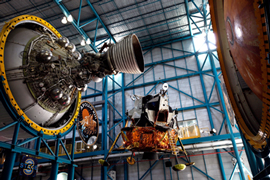Q&A: Was the moon landing worth it?
Curator at Washington’s National Air and Space Museum defends space exploration.

 |
| The US government spends roughly $18bn a year on Nasa, the national space agency [AFP] |
On the 40th anniversary of the first manned moon landing, Al Jazeera questions Roger D Launius, senior curator at the National Air and Space Museum in Washington, about the usefulness of the space programme.
Al Jazeera: Was the space programme worth the money? How much was spent? Why?
| IN DEPTH | |||||||
|
Roger Launius: Absolutely. It brought a whole series of technologies and scientific understanding to the human race. In terms of scientific understanding we have learned a great deal by flying in space for the last 50 plus years – and I’m not just speaking about Apollo [the moon landing in 1969]. This includes robotic probes, satellites and the Hubble space telescope which have changed our perspective of the universe.
Keep reading
list of 4 itemsCould shipping containers be the answer to Ghana’s housing crisis?
Are Chinese electric vehicles taking over the world?
First pig kidney in a human: Is this the future of transplants?
The annual budget for space exploration is less than six tenths of one per cent of the federal budget spent by the US. For all of Nasa each year, we are only talking slightly more than $18bn out of a total federal budget of nearly two trillion. This isn’t very much. There is an assumption when asking that question – about the money spent – that it is expensive, but it is not. We spend more money each year on major sporting events than on space exploration.
Couldn’t the money have been better spent on, say, healthcare, eradicating poverty?
Eighteen billion dollars is roughly how much we spend on Nasa each year. In the US, the annual healthcare programme costs are closer to one trillion each year.
The eradication of world poverty – the funds spent on Nasa would help a few people but it really isn’t that much money. And it is an investment in the future. I personally believe that sum of money – that one per cent – is not very much in terms of what the US spends overall.
In his April 27 address to the National Academies of Science, Barack Obama, the US president, said the Apollo space programme led to the development of technologies that have improved the quality of human life. What technologies?
All kinds of things. There have been numerous spin off technologies that came from the space efforts. Micro-electronics, miniaturisation of all kinds of technologies, computing power – just talking to you over the internet is using satellite technology.
These things were in part, albeit not entirely, the result of the investment in space technologies. There are medical technologies – for example kidney dialysis machines and MRI scanning equipment – that were advanced, in part, by investment in space activities undertaken to understand what was happening to our astronauts in space.
Ask yourself the question, how would our lives be different if we did not fly in space? We can start with the elimination of global instantaneous telecommunications – satellites that relay data and voice transmissions. Without this there would be no internet.
Botanists, biologists and other scientists have been conducting experiments in zero-gravity – why? What are the benefits? How could these experiments impact/change agriculture – for example?
This is specifically oriented towards learning how humans respond to the space environment, to help us understand better how to go somewhere else, ultimately to stay. It is about developing a better understanding of how that might happen.
 |
| Crucial technologies were developed as a result of ‘space race’ efforts, Launius says [AFP] |
That is critical for us if we want to go somewhere else as a community, as humans. Obviously, the key target is the Moon and there are efforts under way to return to the Moon. There’s also the possibility, and lots of people would like to go, of going to Mars.
It is 100 per cent certain we will become extinct if we stay indefinitely here on Earth. That’s several billion years in the future – so nobody should lose any sleep over this right now – but the Sun will become a red giant and it will engulf the planet.
We need to be somewhere else when this happens – several billion years from now – and the process of finding out how to do that will take centuries, if not millenia. It is appropriate to start the process of going elsewhere.
With so much achieved during the ‘space race’ era of 1960-1970 – including six lunar landings – why has the programme appear to have tailed off? Why haven’t we reached Mars yet?
I think this has to do with priorities – as in the budget for Nasa that we discussed earlier. In the overall scheme of things, we’re not spending much on space exploration. Nasa is trying to accomplish its mission on a much smaller budget than seen during the Apollo era.
Why are we fascinated by space?
We have robotic spacecraft that send back incredible information from space – who wouldn’t be excited by that? As only one example there are the images from the Hubble Space Telescope. Then there is the prospect of setting foot on other bodies in the solar system. We live in an exciting age.
